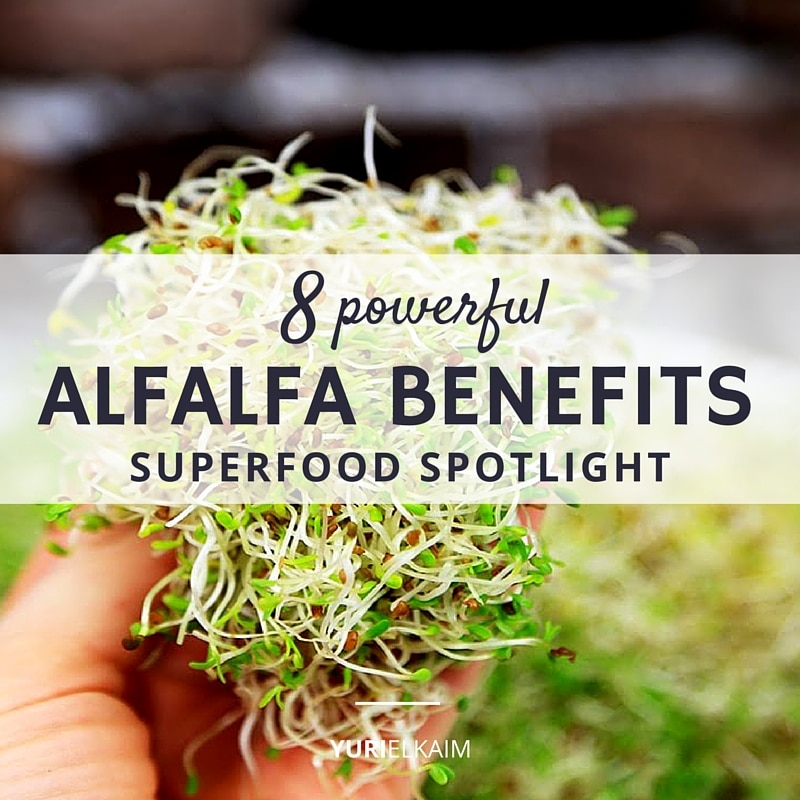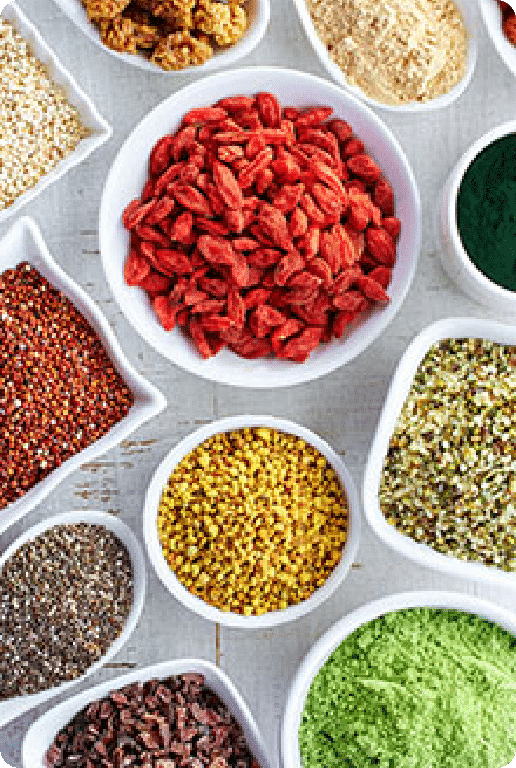When fitness and nutrition experts such as myself rave about the awesome powers of green superfood, you probably think about the usual suspects: chlorella, spirulina, and barley grass.
However, there are several other greens which are frequently overlooked which really shouldn’t be. For example, alafalfa benefits our health in some amazing ways.
What is Alfalfa?
Alfalfa is an extraordinary superfood and has been prized for its healing properties for centuries.
The ancient literature on this incredible plant—the edible parts look like tufts of bean sprouts—dates back to 1300 B.C., and it was used in Iran as fodder for horses. It would find later use in traditional Chinese and Indian Ayurveda as a treatment for a plethora of ailments.
Alfalfa is a perennial plant that grows in a temperate climates and sends its roots up to 20-30 feet deep into the ground.
This allows it to extract essential minerals from the earth that make it such a wonderfully nutritious source of amino acids, vitamins, and minerals.
It belongs to the Fabaceae family, which also includes the humble pea. Although alfalfa is not always thought of as a green, the name itself derives from the arabic term for “green fodder”. That’s good enough for me!
Nutritional Benefits of Alfalfa
Alfalfa benefits milk-producing livestock because of its high protein content and digestible fiber, and is primarily used as both a fresh and dried fodder for horses and livestock.
Besides being a rich source of protein and fiber, alfalfa is also rich in most of the vitamins and some essential minerals like zinc, manganese, magnesium, iron and calcium.
Eventually, the health benefits of alfalfa came to made use of by humans as well.
In its grassy (cellulose) form, it’s problematic for our digestion, but used as seed sprouts, juice, or as dried leaves in powder, tablet or tea form, it’s a wonderful addition to our diet.
I personally love alfalfa sprouts in my salads and lettuce wraps.
How the Superfood Alfalfa Benefits Your Health
With it being a virtual nutritional powerhouse, it is not surprising that alfalfa benefits us in so many varied ways. I’ve listed some of its most important benefits here:
1. Reduction of Serum Cholesterol
Coronary heart disease is such a terrible health problem to be faced with.
Hundreds of studies have found that high levels of cholesterol in the circulating blood are the main reason for the development of blocks in the arteries that are supplying the cardiac muscle.
Diet control, exercise and use of drugs like atorvastatin and simvastatin have traditionally been used to keep serum cholesterol levels in check. However, a preventative diet can do so much as well.
Alfalfa is rich in saponins, phytoestrogen, antioxidants and digestible fiber, all of which prevent fat from clogging up our arteries. Though the sprouts are not very rich in saponins, the dried leaf powder does manage to control serum cholesterol significantly.
2. Control of Diabetes and Obesity
As an added benefit of its fat-binding properties, alfalfa drastically reduces the fat being processed by our metabolism, thus aiding in longterm weight reduction.
Its high digestible fiber content also ensures a feeling of satiety which can reduce our hunger and also our obesity. All of this indirectly benefits patients suffering from diabetes and obesity.
3. Relief from Constipation
The presence of digestive fiber and digestive enzymes in alfalfa is of humongous benefit to our digestion.
Basically, if you eat a lot of it, your bowel movements will improve drastically. For chronically constipated individuals, alfalfa is heaven sent.
4. A Great Source of Protein
Alfalfa sprouts and dried leaf powder are rich sources of easily digestible protein and are therefore a great source of protein for vegans and vegetarians.
5. A Source of Essential Vitamins
Alfalfa is perhaps one of the few foods that can take care of most of your body’s vitamin requirements.
The phytonutrients in the plant include phytoestrogens, saponins, flavonoids, alkaloids, coumarins, phytosterols, amino acids, vitamins, terpenes and digestive enzymes.
That’s a mouthful, but that’s not all!
It’s also a rich source of Vitamins C and K and caters to the daily requirements of the B complex family of vitamins.
In addition to the vitamins, the daily requirements of some essential minerals like magnesium, potassium, zinc, iron, and calcium are adequately fulfilled by eating alfalfa.
Zinc and magnesium are essential ingredients required for the production of testosterone, which makes them an essential requirement for reproductive health, especially in the males.
Adequate testosterone levels are essential for physically active people—especially athletes. Considering this, it’s clear that consumption of alfalfa is a good way to build your body for high performance. I wish I ate more of it when I was a professional football player!
6. Cardiovascular Health
Alfalfa contains certain compounds that prevent the formation of atherosclerotic plaques and clots.
Alfalfa also provides the body with flavonoids, which help in the relaxation of the vascular smooth muscles, thereby rendering them more pliant and thus less susceptible to clogging.
This directly decreases the chances of a cerebrovascular accident and myocardial infarction. In short, it does wonders for your cardiovascular health.
7. Alleviating Kidney Problems and Relieving Fluid Retention
Sluggish kidneys are known to improve with regular use of alfalfa. In fact, it has been traditionally used as a diuretic and many herbalists prescribe it in kidney and prostate ailments.
The thinking is that it reduces the blood urea levels and improves creatinine clearance. This has a cascading effect in relieving fluid retention in patients, which in turn improves overall health.
8. Hormonal Benefits for Women
Alfalfa benefits women deeply as it’s an extremely rich source of phytoestrogens.
If you’re not sure what those are, phytoestrogens are chemicals which are functionally similar to the estrogens produced by the female body; a regular use of alfalfa provides for a hormonal balance in premenopausal and menopausal women.
These are just a few scientifically proven benefits of alfalfa. If you take a look at the history of its use in the realm of folk healing, there are so many more to consider.
Alfalfa tea has been traditionally prescribed to people suffering from various respiratory conditions, everything from bronchitis and whooping cough to allergies and hay fever.
It has also been known as a folk remedy for osteoarthritis and rheumatoid arthritis. Finally, alfalfa acts as an adaptogen, which helps your body restore itself to a general state of balance.
The Easiest and Quickest Way to Consume Alfalfa
I included organic alfalfa juice powder as one of the 8 essential ingredients in my Energy Greens superfood drink mix because its health benefits are so outstanding.
I definitely recommend purchasing it in this form, but however you get it, don’t overlook this superfood. It’s not the most popular green, but it will do wonders for your health!







